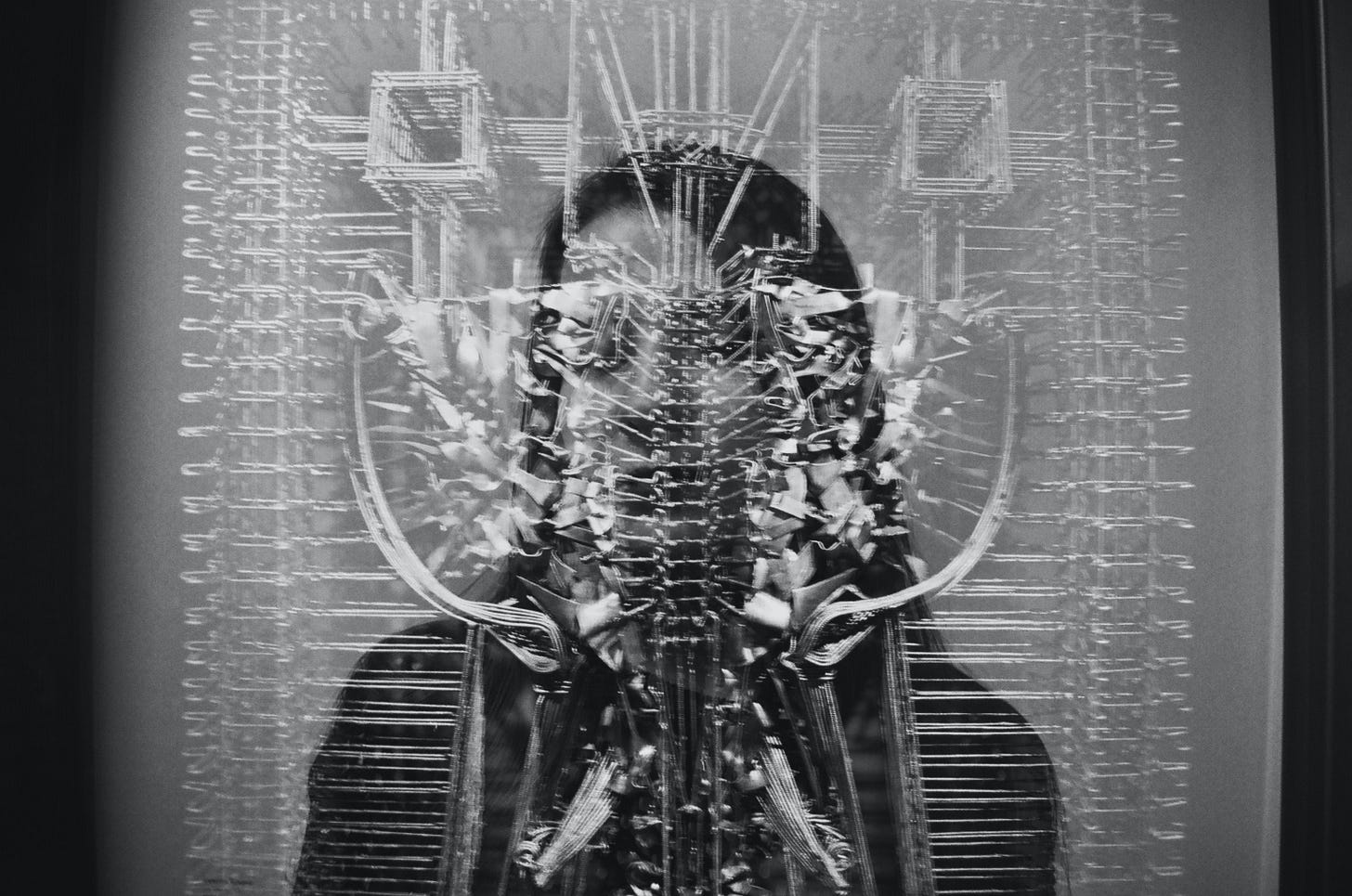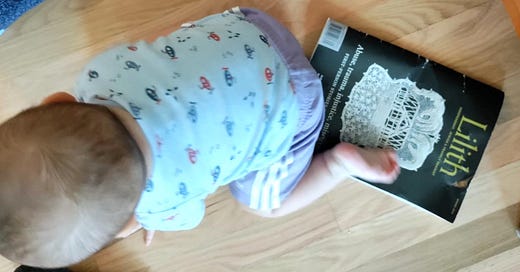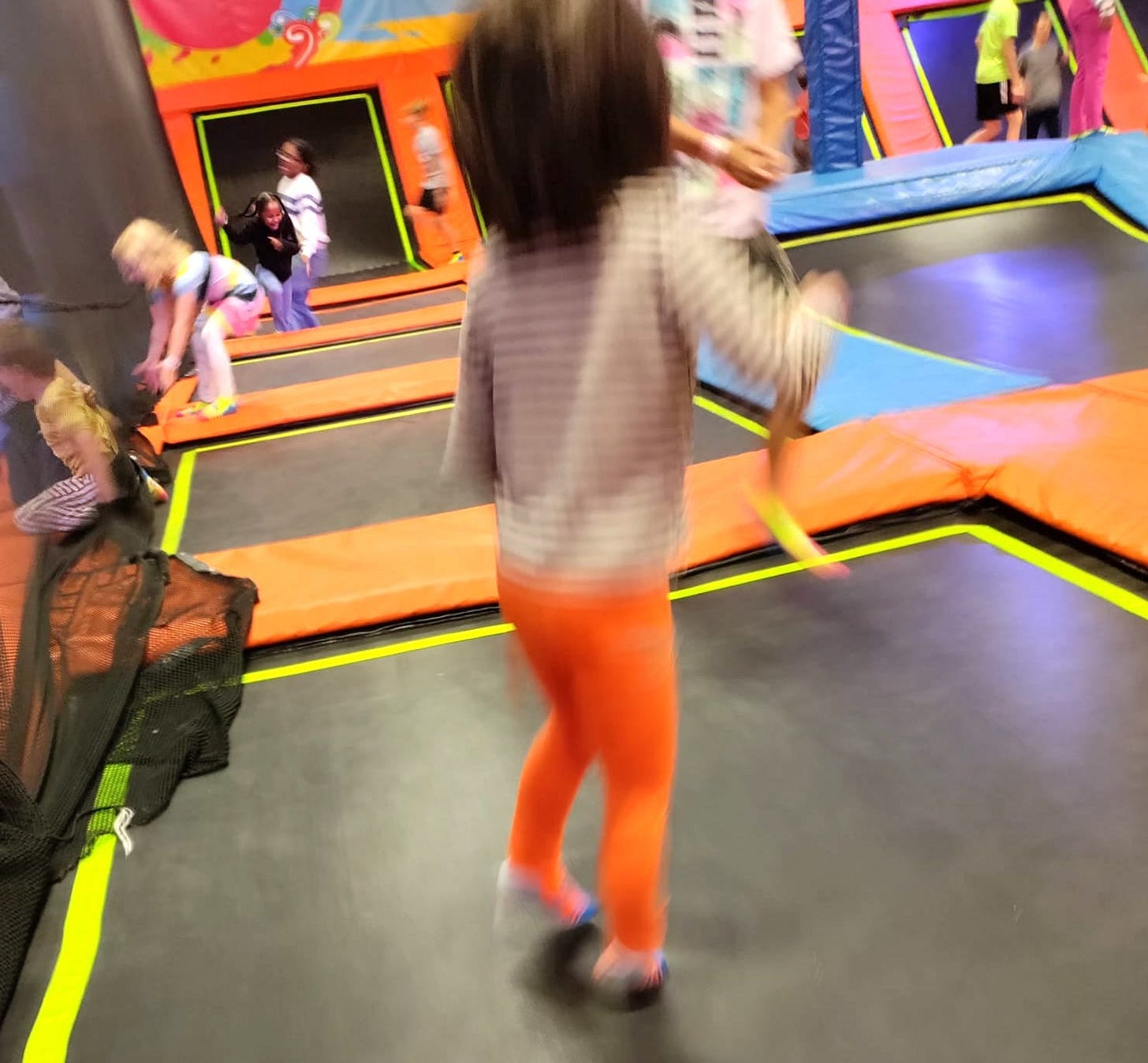This Week: Embracing Imbalance
On the power of discomfort and excavating a spiritual hangover.
Dear fam,
I meant to write you an email before Yom Kippur, but life didn’t work out that way this time. A combination of work overload, two kids with conflicting needs, and a mama and ima who were still recovering from Rosh HaShana meant the newsletter had to wait until after the holiday. Those of you who have been around for a minute may have noticed that I’m not always totally on schedule when it comes to sending out missives from the Chaos Palace.
Which is kind of nicely ironic, when you think about it.
In hindsight, I’m grateful for being forced to push back this writing session. Yom Kippur was intense (no surprise there) and offered a lot of moments for contemplation and questioning. This morning, I’m feeling spiritually hungover — my body aches, my blood feels slower than usual, I’m wondering if all the revelations and visions I experienced really happened. Sometimes, when I sing to G-d on the bima, I feel electrified by something beyond reality, some inexplicable divinity. But now I’m just a person with a cup of coffee, catching up on emails.
It’s a strange sort of space to inhabit. I’d love for you to help me work through my post-Yom Kippur thoughts. I’d also love if you felt moved to share any revelations or ideas in the comments! I promise to respond to each and every one.
Three themes arose throughout the many hours I spent both preparing for and leading services: Imbalance, continuity, and parenthood. They all feel very intertwined to me; imbalance is an inherent part of the other two, for example. That’s why I’d like to write about them all at the same time, in hopes it all makes sense to you (and me) by the time I’m done.
I first started thinking about imbalance last week, when I was rehearsing the Kol Nidrei prayer. This central prayer is traditionally sung three times in three ascending keys (I sing it in E minor, F minor, and G minor). My mother, who is a Cantor and who taught me nearly everything I know about Jewish liturgy, explains that this is a metaphor for the spiritual elevation we, as a community, aim to attain over during our 25 hours of fasting and atonement. I love that idea.
When I was singing, though, another realization dawned on me. The experience of singing Kol Nidrei in three subtly different keys is an unsteady one. When I’m learning to sing something — especially something without accompaniment — I learn to maintain my intonation by feeling where the notes resonate inside my body. In a way, I’m making a physical memory of resonance. For Kol Nidrei, this process must be done over and over again. It’s like having a double-exposed picture in your mind. All the elements are there, but choosing which ones to access is tricky.

Standing on the bima, I was confronted time and again with opportunities to be caught off balance. Singing the repetition of the amidah, traditionally sung with both legs together to emulate the one-legged angels in Jewish mythology, a precarious position for someone as clumsy as I am. Lying face down on the bima during the Great Aleinu, then getting to my feet again singing all the while. Those last hours of the Ne’ila service, hungry and tired and not sure where my voice was coming from, nearly stumbling away from my lectern.
Then, of course, the strange imbalance of trying my best to be a conduit for G-d’s music then heading back to a hotel to change Baby’s diaper and put Big Kid to bed. Big Kid, pushed way past his bedtime and elated to finally see his Mama and Ima again, expressed his joy in what can only be described as inventive parkour. “Look what I can do, Mama!” he yelled, leaping from the desk to the bed, “I can close the curtains myself!” he called helpfully, hanging from the curtain rod. Meanwhile, my lovely wife sat on our bed trying to put an exhausted Baby to sleep. Our heads pounded, but we wanted to be there for our kids. Especially having been absent all afternoon and knowing we’d likely not see them the following day at all.
Indeed, we didn’t see them most of Yom Kippur day. Our incredible babysitters cared for them, fed them, put Baby down for naps, while we stood, sung, prayed.
Being away from our children is, itself, a strange imbalance. What does it mean to hold space for hundred of people in a room that doesn’t include the two people who mean the most to me in the world?
The day before Yom Kippur it rained all day, so I took Big Kid to a trampoline park with new friends. We jumped, and screamed, and leapt from one bouncy surface to another. As I bounced, I hugged my knees to my chest and felt impossibly far from the ground — but just for a moment. It was like flying. Again and again I jumped and hugged, feeling the simple glee of doing something for no purpose but the joy. Big Kid emulated me, then tried climbing some ridiculously high wall. I copied him. We spent a few hours this way, intuitively following one another’s lead, letting our happiness and interest lead the way. For once, not overthinking things. There was no balance to it, in a good way.
On Yom Kippur itself, I had the opportunity to craft and lead a service with whatever music I felt appropriate. For my them, I chose what I call ‘the problem of faith,’ which I defined as the very human wish to find meaning and connect to an ethereal divinity (or something) while being challenged by life’s various travails. My wife, along with our dear friends Lihi and Jacob, sang psalms but also Joni Mitchell and Shalom Chanoch. We presented poetry and questions for folks to ponder in small discussion groups.
What are the ways in which we access our connection to the divine in moments of joy and sadness?
What if spirituality is a journey, not a destination?
How does my connection to the natural world inform how I show up in my daily life?
I usually stand behind a lectern and sing; this level of vulnerability and exposure felt precarious as all get out. It was uncomfortable. I was nervous. I messed up at least three times (that I’m aware of) and have ideas about what I could have done differently, better.
Nonetheless, people went for it. One woman shared how I’d asked a question that caught her off guard. She was grateful for the imbalance.
Over the last week — no, for the last years, things have been shaky. I sometimes tell my wife that life feels like riding a unicycle on a tightrope. Some days, I really fall off that unicycle. But it’s those moments when I’m falling from the unicycle, in between the seat and the net below, that will inform how I get back up. I learn more in those seconds than I do when I’m riding. I get back up wiser and (hopefully) more equipped to meet the shaky tightrope moments that will undoubtedly arise.
I look forward to a few weeks of smoother riding, during which I can process the turbulence of Tishrei.
In the meantime, sending you a lot of love. May we all be inscribed in the Book of Life. May we all meet the turbulence with grace and curiosity.
Shana tova,
Mikhal
What I’m Reading
As I mentioned in a past newsletter, I had the pleasure of reading this new and incredible book about parenting in the age of technology byDevorah Heitner, PhD, and reviewing it for TC Jewfolk. Link to the review a little later. In the meanwhile, go ahead and check out the book here. Also, listen to Devorah chatting with the wise and wonderful
on her podcast here.This essay by Josie Glausiusz about grief, and prayer, and making meaning in the face of inconceivable loss took my breath away.
I’m re-reading Plucked: A History of Hair Removal by Rebecca M. Herzig, which I explored for my essay about body hair, and it continues to blow my mind.
What I’m Listening To
Kate Yeager’s newest song is called Fat, and I love it so much. Didn’t know how to hate myself // ‘til I learned it from someone else she sings, and I’ll always carry it in my body. The music is powerful, with spacey production and arena-ready drums this song is about taking up space both in music and text. That last chorus hits hard. Oof. I hope you check it out and follow Kate’s work on Insta or Tik Tok.
What I’m Writing
Jewish comedian and musician Caitlin Cook has a brand new one-person musical about finding oneself in the wisdom scrawled on bathroom walls. I got to chat with Caitlin and her team for Jewish Telegraphic Agency. Also for JTA, I had the joy of speaking with Nicole Raphael and Yvonne David, who collaborated on this fun family-friendly play about forgiveness and the Jewish experience in early 20th century New York. For the Dreams of Chaos series, I interviewed Em Chiappinelli about enhancing consciousness and spiritual connectivity to life, the universe, and everything. She’s a force of nature and this conversation was a joy.
This Substack is here to publicly explore a hypothesis with you all. The idea behind everything I write here is that life is inherently chaotic. It is only by accepting the messiness of the world can we unlock new realms of creativity and innovation, and relinquish the ego-driven violence that plagues humanity. If you’d like to join that journey, please consider becoming a paid subscriber to support my work. If not, that’s cool, too!






